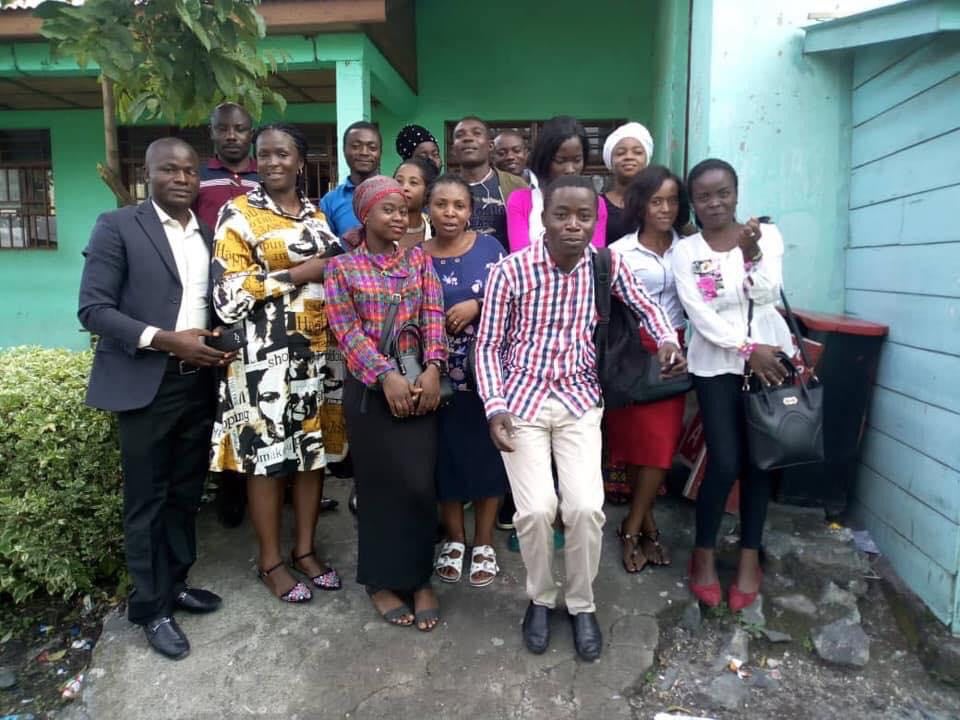
SELF-HELP AND RESILIENCE IN THE DEMOCRATIC REPUBLIC OF CONGO
I interviewed Bertin Kalimbiro from the Democratic Republic of Congo about his work in the Goma region to grow food safely and help people threatened
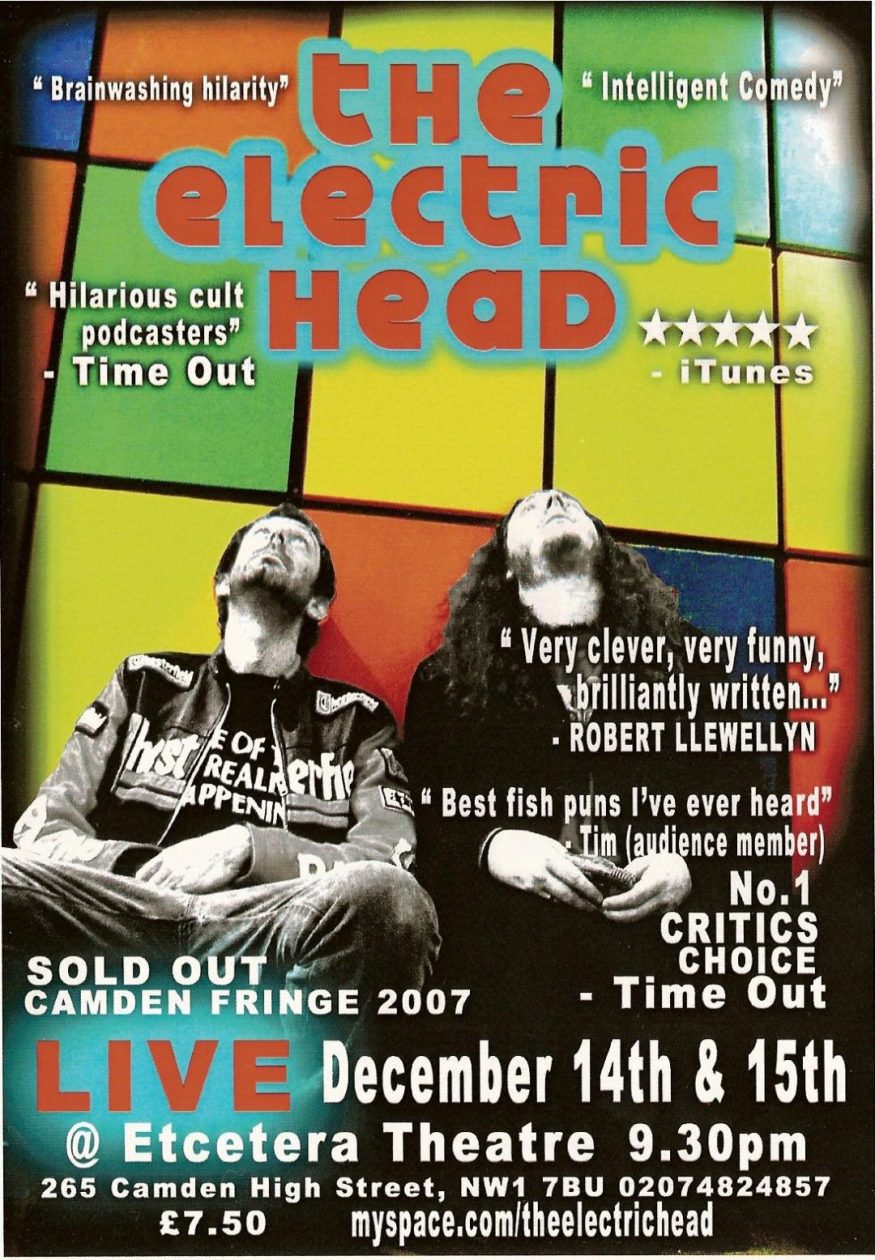
In Part Three of Cy Henty’s interview I asked about his comedy pilots for the BBC, his podcasts and alternative films and the philosophy that sustains him as an innovative actor, writer, artist and comedian.
Leslie: Tell us about your podcasts and what they led to.
Cy: Al Ronald and I put together our first series of podcasts in what we called ‘The Electric Shed’, which was basically a sound-proofed shed at the bottom of a friend’s garden. We would generally record all night fuelled by caffeine. I think I’m right in saying we put together three and a half series altogether. From that we went live, picking out the best sketches to perform at the Camden Fringe.
The festival stage was a tiny space and we had such a variety of different characters and crazy props, including a telepathy helmet and a hippo-head mask which I had made out of mudrock. Unfortunately, although the mask was aesthetically right, I always thought I captured the hippo’s sad expression just right! I had not much expertise in mask-making and Al had to wear a dress and mask which weighed a ton and had no eyeholes to speak of. We had to do quick changes throughout behind a curtain we had strung up in the corner of the room, which as you can imagine resulted in a lot of frantic scrabbling about. To be honest, I think this really added to the manic surreal energy of the show.
We moved from there to filming our first pilot which included a spoof of ‘Long Way Round’ the popular Reality TV Series at the time. We called it ‘Wrong Way Round’ and episode one and two have certainly been one of our most popular online sketches. I had been reading Swift’s Gulliver’s Travels to my son at the time so it occurred to me to combine this with the road trip:
We also got Sam back on board to appear in some of the sketches for our first pilot which brought us to the attention of Simon Lupton at the BBC and then Ali Macphail who had produced The Mighty Boosh at Baby Cow. We went on to develop ‘The Cracks are showing’, our second pilot under her guidance – we were pretty excited at this point – but unfortunately got knocked back by another producer.
‘The Cracks’ is definitely one of my favourite and one of the most intense things I’ve ever worked on. It involved Al Ronald and me locked up in my house at the time, developing the script and taking turns to film each other as I played his nemesis. At times we both thought we were going insane! The work is very autobiographical with Al’s character, I think, embodying our experience as struggling artists in the modern world.
Leslie: So tell me about filming with Al Ronald.
Cy: Over the years I have been lucky to be in two of Al’s films other than ‘The Electric Head’. ‘Chinese Burns’ happened at the time I was living on my friend Dan’s sofa, was written by Julian Lamoral-Roberts and starred Lara Lemon. I played a horrid character who got his comeuppance. During ‘The Cracks are Showing ‘Al, under my direction, had to bury himself naked in the snow and climb a mountain with a ten-foot aerial on his head. In ‘Chinese Burns’ he set out to get his revenge. I remember a freezing October night shoot in a carpark, where, wearing only a shirt, I had to be repeatedly hit over the head with a tennis ball in a sock, dragged around unconscious and then handcuffed. On the same shoot my ex-wife also had the pleasure of smashing a number of sugar-glass vases over my head!
My favourite Al Ronald film I’ve ever been in was a segment of one of The Death Tales horror anthology films ‘Harriet’s War’ in which I again got to work with Lara Lemon and Julian. I played the side-kick PC Jones to Lara’s Harriet Price – a paranormal investigator during the second world war. When I was growing up, my dad had been a village policeman with a moustache so it was weird looking at myself in the mirror with the imperial moustache and the police uniform. Al insisted I keep the moustache I’d grown (he said in case of re-takes) for around a month after the shoot had finished, which raised some eyebrows picking my son up from school and doing the weekly shop. I think Al found the idea extremely amusing but I’m sure I hadn’t needed to keep it that long. PC Jones was a lovely, likeable, innocent character and Al helped me to give what I think is one of my best performances.
Leslie: And I believe you’ve turned your hand to film illustration as well?
Cy: Over the years I’ve provided artwork for Pat Higgin’s films – my favourite being the opening sequence to ‘Hellbride’ in which I actually got to do a voiceover over my own drawings. I also painted a Hieronymous Bosch-style picture for ‘The Devils Music’ and drew some pictures for a new sequence in Al Ronald’s ‘Jesus vs The Messiah.’
Leslie: Would you like to bring us up to date on your current work?
Cy: ‘The Electric Head’ recorded a series of live radio shows at Watford Museum and on stages in the town centre for Watford Live!.
I’ve also been working with Molly Brown, an animator I met at the Horror on Sea Festival. I voiced her comic animations, and was lucky enough to have her animate one of my monologues ‘Lenny the Lobster’ and a comic poem I wrote called ‘The Furniture of Pain’ which I performed trying to channel my childhood hero Christopher Lee.
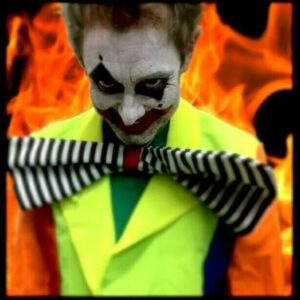
In the last few years I have returned to the stage in non-comic roles, acting for Mark Crane’s Theatre on Wax which I have really enjoyed. I played two characters in his Shadow Town – a promenade performance – and a psychopathic serial killer in ‘Tick-Tock.’ Mark is a great director and a real perfectionist, who always gets a good performance out of his actors.
I’ve also been lucky enough to work with The Art of Disappearing, an immersive theatre company, on their wonderful piece ‘The Lost Room.’ I got to play an eccentric professor for an entire week at the Bethnal Green Museum of Childhood – welcoming ‘Adventurers’ into a magical world.
Leslie: So how would you sum up your experience of being an actor?
Cy: I think I could quite happily stay in character and live in a world of make-believe, to be honest – along with trips into the woods with my son, being everything from Robin Hood, to superheroes to cowboys and improvising and performing with Sam and Al. This is what the majority of my life and work has boiled down to. And in my creative writing and visual art I have often explored identity and the boundaries between fiction and reality. In the modern world with the advent of the Smartphone and other technologies and the rise of reality TV we see that border becoming ever more blurred. I think it was Arthur Cravan the Dadaist performer who said ‘Dream your life with great care instead of living it merely as an amusement’.
Leslie: Could you add something more about the importance of Arthur Cravan to you, please?
Cy: Arthur Cravan was a Poet and Dadaist performer at the beginning of the 20th Century who challenged the audience’s pre-conceptions. His performances included shooting himself and challenging the Heavyweight Champion of the World to a boxing match. I have met a lot of artists over the years who embodied his sense of anarchy and willingness to risk everything for their art – none more so than Russell Brand and Uncle Dan. Those artists have a certain electricity and mania about them – they are both fascinating and at times terrifying. I admire greatly artists who are unwilling to compromise their vision and Directors Al Ronald and Pat Higgins certainly have a spark of Cravan in them also. Pat’s films are intelligent and dare to challenge the conventions of film, genre and stereotypes and I know he has fought hard to bring his vision to the screen on what is often a shoe-string budget. He trusts and believes in his cast and this inspires them to go that extra mile to turn in a great performance. I believe the heroines in his films are iconic from Lucy Sweet to Erika Spawn – and I look forward to the opportunity of working with him again. Al is the same, he has an uncompromising vision in both his film and comedy work and in the midst of battle against the odds he fights on! We will continue to work together as ‘The Electric Head’, well, probably until one of us drops down dead! I also greatly admire independent horror filmmakers MJ Dixon, Jim Eaves and Marc Price who all embody this same spirit. Both comedy and filmmaking are tough industries to work in and it is a testament to these artists that they never give up.
Leslie: What do you think about the idea that general creativity comes out of retaining one’s childishness?
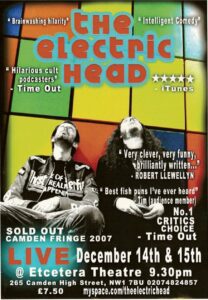
Cy: The idea of ‘retaining one’s childishness’ is interesting. Both my son and my stepson provided a great deal of surreal comedy material for ‘The Electric Head’ when they were young. In a world where we are actively encouraged to systematically destroy our imaginative, playful, emotional, irrational, spiritual, surreal and artistic sides from a young age, I believe, to an extent that we become split in two. I’m not sure if it is retaining one’s ‘childishness’ as much as retaining one’s fascination with the beauty and wonder and absurdity of life. Those 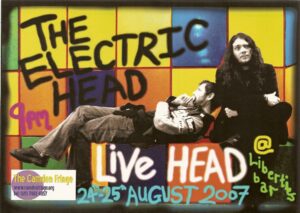 that fight to retain these aspects of themselves are often beautiful and fragile people, whilst at the same time pushing society forward by being inspired or by perceiving the universe in a different way. They are also able to examine their own minds and willing to bare their souls. They fight hard to retain their honesty and dignity in a world where people are expected to hide their true selves and toe the line. When my first comedy partner Sam Ball and I used to improvise late at night, many years ago in his father’s warehouse, we would think of it as therapy in a way – but it was also ‘play’ and it is the ability to play that is lost. We would take on different characters and pull off masks (literally miming that we were pulling off rubber masks like in Mission Impossible – one of our early catchphrases was ‘This is not my true identity’) surprising each other, trying to outwit each other – but also often exploring many dark paths within ourselves and being quite brutal toward each other. Sometimes this led to hilarious results… occasionally we’d go too far and that material was rarely put on stage! Always we would go for a pint afterwards and feel relaxed and happy. The ‘play therapy’ had not only given us some great material but exorcised a lot of our worries, fears and anxieties as we tried to make sense of an often cruel and incomprehensible world. Al Ronald and I also play in the same way – and challenge each other. The philosophy of ‘The Electric Head’ was always to remember and help our audience to remember the dynamic, beautiful yet chaotic position we are truly in. On a rock, spinning around a huge radioactive fireball in a void. I try to remember this every morning. Is it worth worrying about the trivial? A lot of the constructs of society it seems are a dark theatre meant to distract us from the incredible and wonderful nature of our true reality – to direct us toward consumerism – and often toward a slavery of the mind. That instinctive and dynamic half of ourselves is chained up somewhere in the labyrinth beneath the domed ceiling of our skulls and our mind’s eye is blinded.
that fight to retain these aspects of themselves are often beautiful and fragile people, whilst at the same time pushing society forward by being inspired or by perceiving the universe in a different way. They are also able to examine their own minds and willing to bare their souls. They fight hard to retain their honesty and dignity in a world where people are expected to hide their true selves and toe the line. When my first comedy partner Sam Ball and I used to improvise late at night, many years ago in his father’s warehouse, we would think of it as therapy in a way – but it was also ‘play’ and it is the ability to play that is lost. We would take on different characters and pull off masks (literally miming that we were pulling off rubber masks like in Mission Impossible – one of our early catchphrases was ‘This is not my true identity’) surprising each other, trying to outwit each other – but also often exploring many dark paths within ourselves and being quite brutal toward each other. Sometimes this led to hilarious results… occasionally we’d go too far and that material was rarely put on stage! Always we would go for a pint afterwards and feel relaxed and happy. The ‘play therapy’ had not only given us some great material but exorcised a lot of our worries, fears and anxieties as we tried to make sense of an often cruel and incomprehensible world. Al Ronald and I also play in the same way – and challenge each other. The philosophy of ‘The Electric Head’ was always to remember and help our audience to remember the dynamic, beautiful yet chaotic position we are truly in. On a rock, spinning around a huge radioactive fireball in a void. I try to remember this every morning. Is it worth worrying about the trivial? A lot of the constructs of society it seems are a dark theatre meant to distract us from the incredible and wonderful nature of our true reality – to direct us toward consumerism – and often toward a slavery of the mind. That instinctive and dynamic half of ourselves is chained up somewhere in the labyrinth beneath the domed ceiling of our skulls and our mind’s eye is blinded.
Leslie: Thank you. I’m reminded of Baudelaire’s, ‘Genius is nothing more nor less than childhood recaptured at will’.
Cy: Yes, that’s a beautiful insight, so relevant today. Because I don’t think it is childish to keep the artistic part of oneself alive, it is just that that part of ourselves is often lost to childhood, because we are told to destroy it, to deny it so that we will follow the often absurd rules of a corrupt and cruel society. Truly, I believe human nature is loving and compassionate and that we are all imaginative and beautiful, and that if we can prise open the lids of our own mind’s eyes – or help even for a moment others to do so, through games, through play through comedy, film art and performance, through being honest to ourselves, through being able to laugh at ourselves. If we can cut through the bullshit pumped to us daily by the media moguls and corporations and see both the beauty of the universe and humankind, life becomes thrilling and fascinating again and we retain the will to live and live wonderfully, in what is often a surreal and absurd reality full of chaos, both terrifying and awe-inspiring.
My love of acting, writing, performance and visual art is because it allows that part of me to be free – and I hope connect with that part in others – that spark, that incredible light that we often catch a glimpse of behind the windows of the soul. It is never truly extinguished and we need to fan the flames in order to ignite it once more.
ABOUT LESLIE TATE’S BOOKS:

I interviewed Bertin Kalimbiro from the Democratic Republic of Congo about his work in the Goma region to grow food safely and help people threatened

I interviewed computer expert and sustainability campaigner Dr Erlijn van Genuchten, who writes easy-to-understand books based on science full of practical suggestions for planet-friendly living.
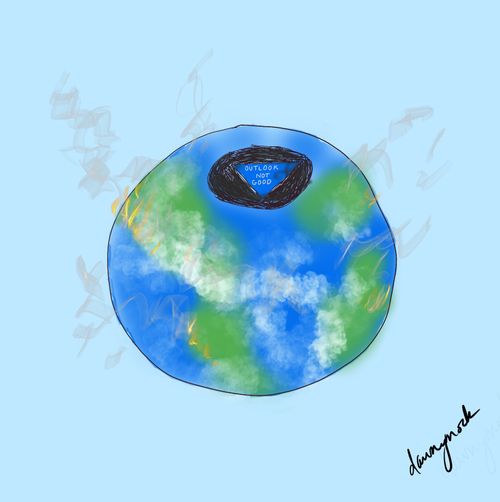
I interviewed Canadian cartoonist Dawn Mockler about how she works on cartoons that might be environmental or wordless but always witty – especially her famous
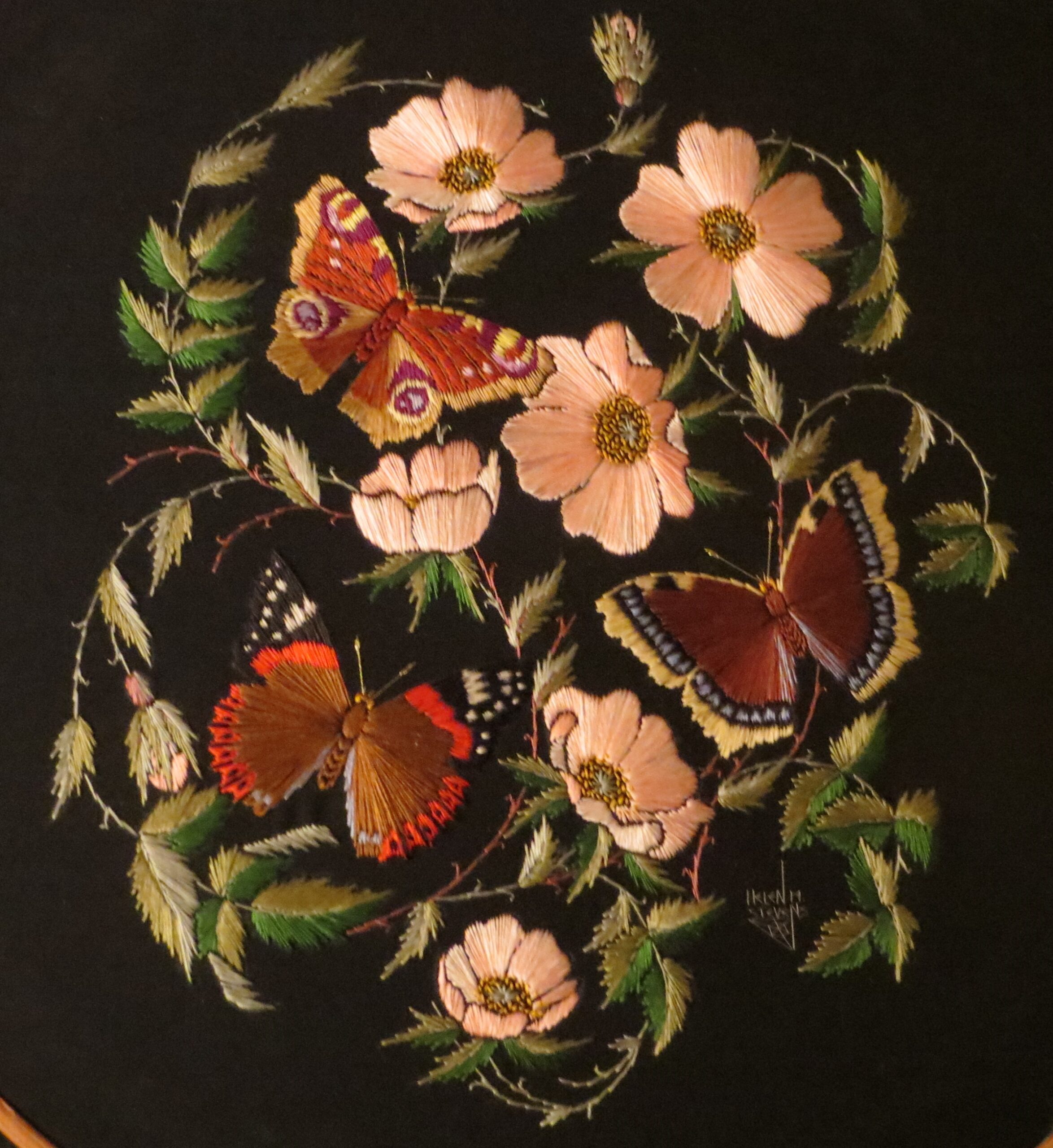
I inteviewed Helen M Stevens about how she has revived the art of embroidery, creating original contemporary patterns while studying and drawing on, “One of
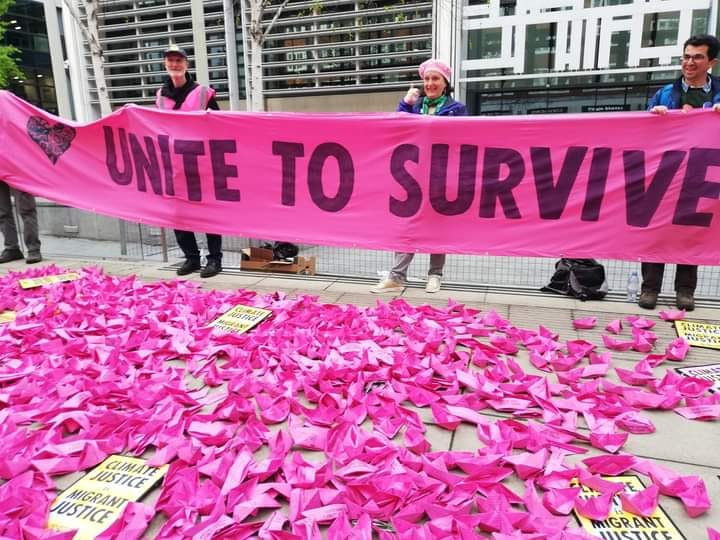
I interviewed Councillor Rachel Smith-Lyte about the origins of her passion for nature and her environmental activism. Rachel tells the story of her teaching (and
| Cookie | Duration | Description |
|---|---|---|
| cookielawinfo-checkbox-analytics | 11 months | This cookie is set by GDPR Cookie Consent plugin. The cookie is used to store the user consent for the cookies in the category "Analytics". |
| cookielawinfo-checkbox-functional | 11 months | The cookie is set by GDPR cookie consent to record the user consent for the cookies in the category "Functional". |
| cookielawinfo-checkbox-necessary | 11 months | This cookie is set by GDPR Cookie Consent plugin. The cookies is used to store the user consent for the cookies in the category "Necessary". |
| cookielawinfo-checkbox-others | 11 months | This cookie is set by GDPR Cookie Consent plugin. The cookie is used to store the user consent for the cookies in the category "Other. |
| cookielawinfo-checkbox-performance | 11 months | This cookie is set by GDPR Cookie Consent plugin. The cookie is used to store the user consent for the cookies in the category "Performance". |
| viewed_cookie_policy | 11 months | The cookie is set by the GDPR Cookie Consent plugin and is used to store whether or not user has consented to the use of cookies. It does not store any personal data. |
2 responses
Leslie, this was a fantastic interview. I resonated with lots of it, especially about childhood and retaining your childhood outlook. I’ve been told over and over again in my life to stop floating on clouds and come down to earth. Now, I’m at an age where I don’t give a **** what others think of me as long as I’m true to myself.
Hi Adele. It’s great you enjoyed Cy’s piece so much. Do you think it might inspire you to produce a companion piece, describing your ‘childhood experiences that resonate’ and writing about all the adult interests/experiences that have helped you to ‘retain childhood’? I’d also be interested in the story of those people telling you ‘over and over again to stop floating on clouds’ – how they affected you and how you broke free. L xx